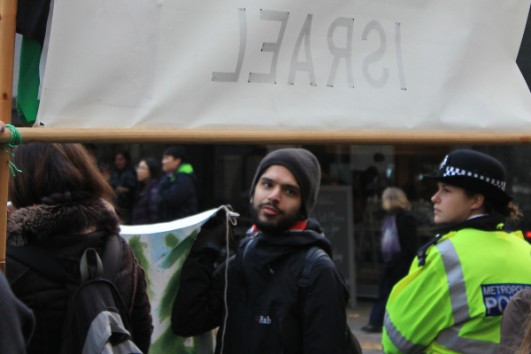According to a new poll, 75 percent of British Jews believe Israeli settlements are a ‘major’ obstacle to peace. Over 60 percent believe making peace with the Palestinians is Israel’s top priority.

The British Jewish community is undergoing a shift in its attitudes towards the Israeli government, according to a new report released on Thursday. The survey, which was funded by British “pro-Israel, pro-peace” group Yachad and conducted by academics at the City University in London, showed that while British Jews are overwhelmingly supportive of Israel as a Jewish state, a large majority — 75 percent — believes settlements are a “major” obstacle to peace.
A significant majority also expressed dismay at the government’s failure to stop building in the occupied West Bank, with 68 percent agreeing with the statement “I feel a sense of despair every time Israel approves an expansion of the settlements.” In addition, most British Jews — 61 percent — believe that making peace with the Palestinians is Israel’s top priority.
However, some resistance to the term “occupation” remains, with only 53 percent of respondents agreeing that they view Israel as an occupying force in the West Bank. They also expressed nuanced and conflicted views on Israel’s control of the West Bank, depending on whether withdrawal from the occupied territories was related to peace or security. When questioned on Israel maintaining the occupation as a matter of security, 50 percent of respondents agreed with the statement that “Israeli control of the West Bank is vital for Israel’s security.”
However, when quizzed on the matter with regard to peace, an even bigger majority (65 percent) expressed the reverse opinion — that Israel should give up land “in exchange for guarantees of peace with the Palestinians.”

Speaking with +972 Magazine, Yachad director Hannah Weisfeld addressed British Jews’ evident unease towards describing Israel’s control over the West Bank as occupation.
“People find occupation a difficult word as it implies a negative set of connotations associated with Palestinian rights,” Weisfeld said. “I think it is somewhat easier to see settlements in the abstract, unrelated to the notion of ‘occupation.’ I suspect people recognize it is a problematic policy for Israel, even if they do not believe the settlements are a product of occupation.”
Nevertheless, the report brought up some more unexpected results. Nearly a quarter, 24 percent, of British Jews would support some sanctions against Israel if they would compel the Israel government to recommence negotiations with the Palestinians. According to the report, such attitudes appear to be more prevalent among younger generations.
With regard to labeling of products from the settlements, only 37 percent of under-30s said they could see no justification for Israeli products from the occupied territories being labeled as West Bank produce. Furthermore, fewer British Jews consider themselves Zionists than might be expected, with only 59 percent adopting the label. This is a decrease of 72 percent from the last such survey of British Jewry, conducted in 2010 by the Institute for Jewish Policy Research.
The report notes that this in contrast to the “more-or-less constant” level of attachment for Israel as a Jewish state and may be attributable to the increasingly negative connotations associated with Zionism, but that the issue warrants further investigation before any conclusions can be drawn.
The report also touched on political psychology, exploring respondents’ views on how prevalent they thought their own opinions were among British Jews. The results showed vastly different assumptions based on which side of the political spectrum respondents were on. Those broadly on the Right – which the report classifies as “hawks” — overestimated the prevalence of their own views by a factor of two. “Doves,” or those broadly on the Left, underestimated the prevalence of their own views by 10 percent.

Commenting on the significance of the report’s findings, Weisfeld said: “In my experience there is a perception beyond the Jewish community that we speak with one voice, and we are very black and white in our relationship to Israel. The report shows is that there is much more nuance to it than that.” Nonetheless, Weisfeld added, “it is going to take some time for people to digest the contents. Sadly some people cannot even see that there are significant parts of the research findings that they will agree with. But for the bulk of the community it is going to raise challenging questions about how we should be engaging with decision makers both in Israel and here.”
Discord among British Jews has also been brewing in the context of the current wave of violence, with one group of students recently addressing an open letter to British Jewish institutions under the heading “It’s not just #IsraeliLivesMatter,” protesting the establishment’s promotion of an “us versus them” narrative vis-a-vis Israeli and Palestinian deaths in recent weeks. The prevalence of these burgeoning voices in the UK seems to be borne out by the Yachad report.
As Weisfeld noted: “It shows you can be a whole-hearted supporter of Israel’s right to exist, have real worries about security, and yet also be deeply concerned by policy choices of the Israeli government. That is an important message for people beyond the Jewish community to hear.”
Yachad’s poll was conducted among 1131 British Jews, using three different sampling techniques in order to ensure as broad and accurate a representation of British Jewry as possible. The survey was conducted between March and July of 2015, and the estimates set out here are subject to a margin of error of 2.9 percent in either direction when based on the entire sample.


